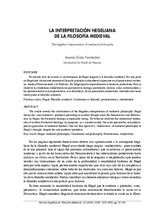La interpretación hegeliana de la filosofía medieval
The Hegelian Interpretation of Medieval Philosophy
Autor
Ginzo Fernández, Arsenio
Editor
UCOPressFecha
2016Materia
HegelFilosofía medieval
Cristianismo y filosofía
Protestantismo
Subjetividad
Medieval philosophy
Christianity and philosophy
Protestantism
Subjectivity
METS:
Mostrar el registro METSPREMIS:
Mostrar el registro PREMISMetadatos
Mostrar el registro completo del ítemResumen
El artículo trata de mostrar la ambivalencia de Hegel respecto a la filosofía medieval. Por una parte
en Hegel está claramente presente el llamado prejuicio antimedieval imperante en el pensamiento moderno,
desde el Renacimiento y la Reforma. En Hegel pesaba especialmente la herencia protestante. Pero al
observar las tendencias subjetivistas en que derivó la teología protestante, recurre, como contramodelo, a
los planteamientos más especulativos, más filosóficos, de los pensadores medievales, reivindicando hasta
cierto punto la filosofía medieval. The article reveals the ambivalence of the Hegelian interpretation of medieval philosophy. Hegel
shares the «anti-medieval» prejudice prevailing in modern thought since the Renaissance and Reformation.
In Hegel, the Protestant heritage is especially strong. Yet when he observes the subjectivist tendencies
of modern Protestant theology, he proposes, as a counter-model, the more speculative and philosophical
approaches of medieval thinkers. One can thus speak of a «vindication» of medieval philosophy in
Hegel´s thought, despite his anti-medieval prejudice.

